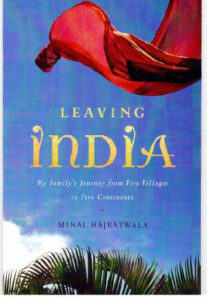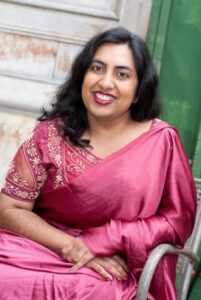Minal Hajratwala’s first nonfiction book ”Leaving India” has been widely discussed among immigrant communities in the U.S. She has spent seven years to complete the writing. She traveled five continents and nine countries to fulfill the mission. ”Leaving India” is a unique blend of personal elements and history, according to famous book reviewers. She has discussed the gain and loss of immigrant community in her book. Minal worked for San Jose Mercury News for over six years. She has been an activist of lesbian journalists association. Living in San Francisco, she has received many prestigious awards and recognitions for journalism and poetry. She shares to CalicutNet, her experience of the soul-searching journey and sublime, diligent researches to Rajesh Kumar Edacheri, in an exclusive email interview.
Q. What prompted you to write a non-fiction book on immigration? A. In our families, migration stories are often told as very personal. But of course there must be huge social and economic and political factors at work, to make people suddenly uproot themselves and migrate. There are reasons that certain borders were open or closed to Indians at different periods in history. So I set out to understand how these larger forces of history intersected with individual lives. I wanted to understand not only why my family was in the United States, but also why I have thirty-six first cousins who live all over the world, why my grandparents and great-parents left India, and how our diaspora grew – from fewer than 400,000 people living outside India a century ago, to an estimated 19 million to 30 million people living in diaspora today. All of those questions are connected, and in the answers are connected too. Q. You took seven years to publish this first book “Leaving India”. Was it a journey searching for the roots? Q. You spent seven years on a foggy hill for writing this book? Did you enjoy that tranquility or were disturbed any time because there is a journalist within you, searching for every new development, basically? A. I was a journalist and a poet for many years before I began this book. It turned out that neither poetry nor journalism was quite big enough to hold my family stories; I needed a narrative, almost epic form. I was interested in the challenge of combining reportage with a more emotional voice. And it turned out to be a challenge, indeed. In addition there was the challenge of sorting through all of the material I had gathered in my research: a box of more than thirty audio taped interviews, an entire file cabinet of archival papers, and several dozen books. It was more hard work than tranquility, although I certainly was lucky to have a quiet and beautiful place to write. Q. The prominent international book-reviewers points out the colorful blend of personal traits and historical transformation of Indian lives abroad in “Leaving India.” How do you feel this? Q. How do you look on the book-publishing arena of immigrant community? A. There is a very vibrant community of writers from South Asian and other immigrant communities in the United States now, and I think it’s wonderful that our stories are being told. Q. Your mother was born and reared in Fiji and father in India. How was your childhood experience? Q.”Hajratwala” Is this name has any root in Gujarat? A. Yes, hazrat was the word for prophet and my great-great-grandfather was said to have had the gift of prophecy. Q. How did you feel the transformation of weavers’ life in Gujarat? A. The weavers in Gujarat suffered with the rise of machine-made cloth. It was difficult to make a living and this led people to seek work as tailors in the cities, first Surat and Bombay, then eventually overseas. Q. Is it really a painful experience, leaving home country and migrate to another from your experience? A. For some of the people I interviewed it was painful, for others it was exciting and beneficial. I think there are usually both some loss and some gain; how much of each depends on people’s individual circumstances, who and what they were leaving behind and how their lives unfolded. |



